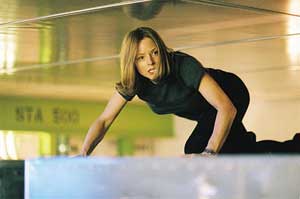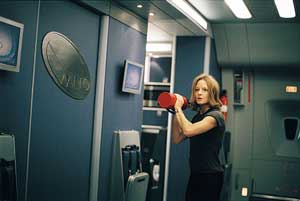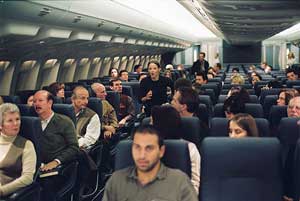 If I need to introduce you to Jodie Foster, you need to go back to iamhopelesslyoutoftouch.com. Foster is starring in Flightplan,
If I need to introduce you to Jodie Foster, you need to go back to iamhopelesslyoutoftouch.com. Foster is starring in Flightplan,
which opens everywhere this weekend, as a mother on a plane who
discovers that her daughter is suddenly missing – and may never have
been there in the first place.
One of the highlights of the
Toronto Film Festival this year was getting a chance to talk to Foster
at a very intimate roundtable, where I really got a chance to hog the
proceedings with my questions about child stars and kiddie prostitutes.
Q: You’re considered a cerebral actress, but this role is particularly emotional. Did that appeal to you?
Foster:
I think she’s a pretty heady person. I like the fact that she is
continually trying to stay on top of herself and they [the other
characters] continually try to project hysterical, hysterical,
hysterical. There’s a wonderful progression to the character in that
she goes from, I’m going to hold back, I’m going to stay on top of it,
I’m going to be logical. I’m going to be polite and say, ‘Please will
you help me.’ But as time goes on, almost primal instincts come out.
The profiling, for example – we can be as global and international as
we want, but in a time of crisis we revert to this very instinctual
‘It’s your fault, you did it,’ thing. So she goes through that.
Finally,
in this place of final desperation, for a split second she ends up
questioning her own sanity because the grief is so intense and it
doesn’t make sense to her. She questions her sanity for one second, and
when she gets to the other side of that, all of the politeness is taken
away and she’s released and will take down anybody in her path. So
yeah, I had to follow that as an actor, and the script had to be
architected as that. It’s a profile of this woman, it’s not like Panic Room,
which is a visual thriller, it’s about the camera and how the camera
moves among the characters in that space – this is all about this
person’s psyche. The point view of the film is her psyche’s point of
view.
Q: You bring up Panic Room, which is
similar not only in that it takes place in a confined space, but is all
about what a mother will do for her daughter. Now that you’re a parent,
are you more interested in exploring in films now, that maternal
relationship?
Foster: I think
anybody who’s over 30 plays parents, because that happens. It happens
in your 30s, so it’s a natural progression. I’m drawn to it – it’s
probably the most intense, passionate thing that happens to you in your
life.
The confined space thing: I enjoyed both films, they’re
very different films. I like it because you can’t cheat. You can’t cut
to Big Ben and then cut to somewhere else in order to transition the
film, to give the film its tone. It has to have it on its own, and the
characters have to take you from feeling to feeling. There’s a real
discipline to it, it’s like theater.
Q: Panic Room was the last film you were in, right? Foster: I did the Jean-Pierre Jeunet film [A Very Long Engagement], I did a bit in that.
Foster: I did the Jean-Pierre Jeunet film [A Very Long Engagement], I did a bit in that.
Q:
So you’re not working that much lately. Is it because your first
priority is being a mother, or is it that you’re very picky with
projects?
Foster: It’s kind of a
lot of things. I think definitely my kids are young and my life with
them is really stimulating and full and feels significant. For
something to take me away from them it has to be something equally
significant. It hasn’t always been that way, because I worked for 40
years. Maybe in my 20s I would have had different priorities. And then
yeah, because I’m picky, and I’m over 40 and there aren’t as many
parts, so I only want to do the ones that really move me.
Q: Peter mentioned that working on that plane set was a little claustrophobic and smelly.
Foster:
There were days. We were all pretty excited to get off the second. When
we wrapped the second floor we were pretty excited. And then we got to
the first floor which looks just like the second floor.
That
is a challenge, but it’s kind of like theater. It’s like doing a play.
I liked everybody. It was just a pleasant movie and the director is
such a lovely man. He’s such a good leader and unassuming and very
interesting. He knows all sorts of different things about punk music
and recipes and opera – just a really interesting guy.
Q: Are you a good flier?
Foster: I go to sleep within five minutes. I’m a really good flier. I like airplanes.
Q: How do you deal with high stress situations?
Foster:
I stay way calm. I’m a really calm, cool one. I sometimes lose it when
it has to do with the kids. But in any other situation I’m like the
perfect police officer. License and registration, please.
Q: Is it a challenge to find diverse roles?
Foster:
It is hard. And as time goes on you realize you are better cast in
certain things than in others. There are some movies that you’re not
that well cast for. In your 20s people don’t know as much about you so
they don’t bring the baggage to it, so maybe there’s a wider range of
stuff you can do. But there are some things you know that you’re just
not as good at.
Q: Do you feel a responsibility to make films with a meaning?
Foster:
I think the artist’s responsibility is complex. It’s not just ‘Oh I’m
only going to make movies with socially progressive issues.’ I think
it’s a more complex question. I’m developing a movie about Leni
Riefenstahl, so that sort of issue comes up a lot. What is the moral
responsibility of an artist? Is it art for art’s sake or do you have to
take into consideration the moral impact of what you do?
Q: Have you been able to answer that for yourself?
Foster: For me, definitely. You make mistakes, but you try to – hopefully – make people
better and not worse. You start with yourself. You hope the movie
encourages you to be more open and more involved and less narrow and
better. You want to leave that movie after 55 days of shooting and feel
like you’re a better person, not a worse person. That’s your first
impulse.
Of course the first impulse is selfish. It’s good to
be selfish, because if you’re an evolved person it extends to everybody
else too.
Q: Where are you with Flora Plum? You’ve been working on it for such a long time.
Foster:
I don’t know where that movie’s going to go. I hope it’ll get made some
day. It’ll just be one of those stories where the film gets made ten
years later. It’s been a tough one. It’s been a tough road.
Q: Is it going to get made with you?
Foster: I don’t know. I don’t know if there will ever be anybody who’s as passionate about it as I am. So I don’t know.
Q: The Riefenstahl project – is that for you to star in?
Foster: Yeah.
Q: Will you direct that as well?
Foster: I don’t think so. I prefer other people to direct me.
Q: What do you like about directing?
Foster:
It’s really my language. It’s how my head works, how my mind works, it
feels complete. Acting is so difficult because you’re always trying to
accommodate someone else’s vision, someone else’s notes. You’re trying
to cut out your intellectual side and keep in your emotional and
physical side. Directing is complete. It’s as intellectual as it is
emotional and requires a kind of wonderful, satisfying skill where,
like a composer, you look at the whole symphony and then you pick up
the drums and adjust the violins. You love the whole thing, but you can
pick out the little parts. That’s so my personality, I love it.
Q: How has that affected you as a performer?
Foster:
I think it makes me an easier actor to work with, because I know why he
needs the things he needs. You’re bringing another pair of skilled eyes
to the process. I think most directors would say that it works so much
better to have actors who have directed before. The nice thing is that
because I can direct my own movies, I don’t need to direct anyone
else’s. I don’t want to step on their territory, and I don’t cede mine
as a director. It doesn’t have to reflect my directorial signature to
have my acting in it.
Q: Does not wanting to direct yourself come from Little Man Tate?
Foster:
It wasn’t a bad experience but it was hard, and it rips the joy out of
both tasks. You don’t get any downtime. As an actor you get
shortshrifted – you don’t get any feedback on your performance and you
end up playing safe because you get just what you asked for.
Q: You’re one of the few child actors who made it.
Foster:
It took a lot of work. It’s not a given. It’s not something that you
just get handed. You have to work on trying to control that. Q: Because you managed to do that, do you feel a responsibility to young actors as a role model?
Q: Because you managed to do that, do you feel a responsibility to young actors as a role model?
Foster:
Yes and no. I want to be inspiring to myself, to my kids, to my family,
to my friends. Sometimes I make mistakes and I do bad things – that’s
part of the process too. But I don’t know if I’m much of a role model.
I’m an idiot!
Q: I read something that made me really happy – that you love Bugsy Malone, a movie I thought maybe you wouldn’t be so proud of.
Foster: Really?
Q: It’s so weird.
Foster: It is weird.
Q: What are other films from your career that you’re proud of that don’t get talked about a lot?
Foster:
You know, the film I produced, I didn’t actually produce it, I had
nothing to do with this movie, but it’s the thing I’m proudest of that
came out of my company. We sort of acquired it for American
distribution. It was a French film called Hate, and I thought it was such a spectacular movie and I was so proud to be involved with that film.
I loved Hotel New Hampshire.
It’s an acquired taste, that film. I think it made people feel really
uncomfortable because it’s, like most John Irving things, it has a
fantastical element and a really mundane element to it, and you don’t
know which one you’re in at all times. But I love that about that film,
and I guess I have such fond memories of Montreal. I keep friends from
that film.
Q: You grew up on camera. What is it like looking back at those early films?
Foster:
It’s like looking at a scrap book. The films I made when I was 14 or 15
I have a hard time looking at. The awkward years. I don’t think anybody
can look at stuff they did at 14 and not wince.
Q:
Looking back at some of your earliest films, I was struck by how you’re
cast as a very sexual character at a young age. The precocious girl in
Alice Doesn’t Live Here Anymore, the hooker in Taxi Driver. How does
that affect you as a person? Were you separate from that?
Foster:
I went to a private school and I wore a uniform. I wasn’t sheltered,
because I saw everything and knew everything, but I was raised kind of
conservatively. It definitely didn’t trip over into my own life at all.
It’s like reading a book and interpreting a book. I always knew the
distinction between real life and acting. I never had a problem
distinguishing between the two.
The thing with child actors is
that you either have the weird personality where you can do it and
remain well adjusted and have a real strength of character or you just
don’t have that make-up. It’s like being an astronaut – some people can
handle zero gravity, some people can handle the solitude, some can’t. I
could handle it.
Q: Did going to school and getting a degree help? A lot of child actors seem to put their career ahead of school.
Foster:
It’s understandable that they would, because they want to be actors and
those are their prime years. If you feel passionate about acting, you
want to be acting. I didn’t feel very passionate about acting when I
was in my teens, when I was 18. I thought I wanted to do other things.
Frankly acting has never been this, ‘I have to do it!’ thing. I didn’t
choose it. It wasn’t my personality. I’m in films because I love making
movies. I love the language of films, and I would be just as happy
being a technician or being a director, just to be involved in films.